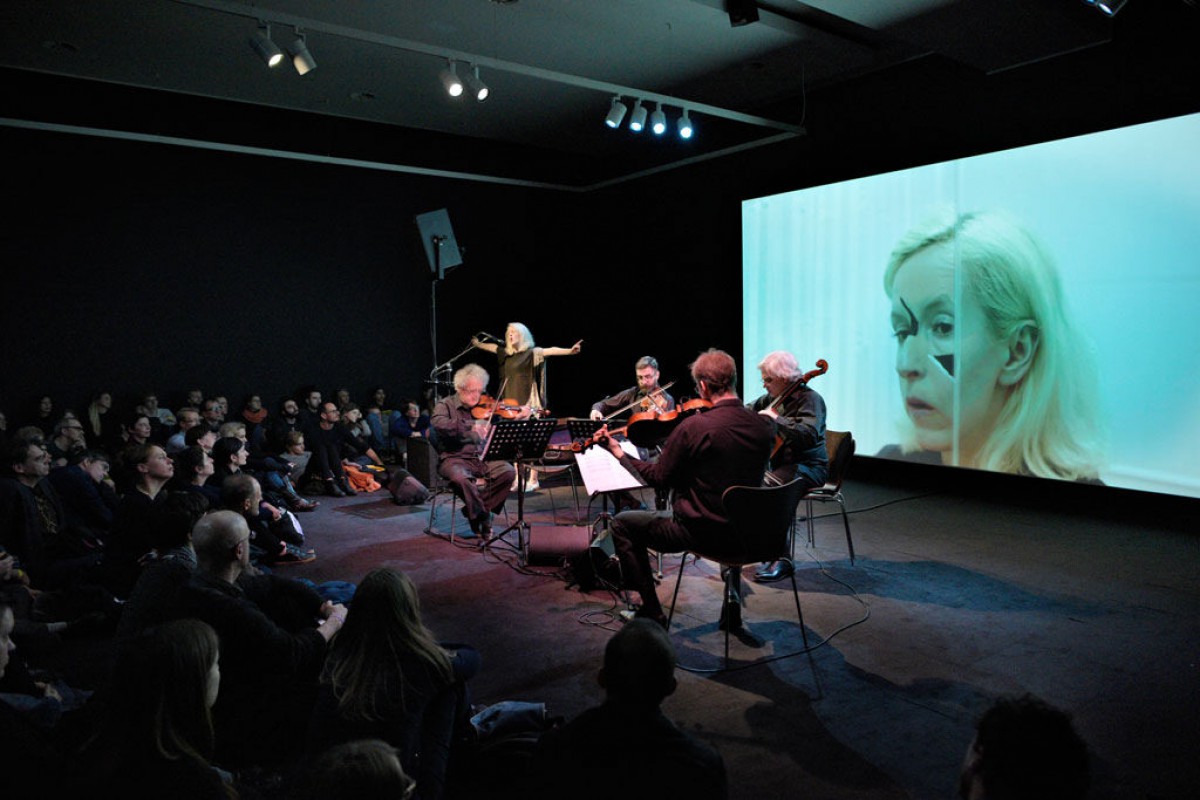Sunday 26 February 18:21

Jennifer Walshe and the Arditti Quartet, Sonic Acts 2017. Photo by Pieter Kers
by
Linnea Langfjord
We enter a dimly lit room. In the center of the room is a semi-circle of chairs, which sits in front of a large, white screen. “... And then I could just smell it, like that, it was so recognisable!”, one girl says to her friend. There is a megaphone to the right of the set-up and a large paper megaphone to the left. The audience sits on the soft carpeted floor. “Maybe I’m gonna enjoy this beautiful hat in front of me”, someone says as the room fills up and people try to find a place to sit. Jennifer Walshe and the quartet enter. One cello and three violins.
“5, 4, 3, 2, 1, go”, Walshe says in a calm voice. The performers freeze and hold their breath in anticipation. The lights go off, then come on again. “The drone is coming in and they are smiling!”, Walshe sings loudly. The Arditti Quartet plays a frantic melody for eight seconds. Everyone freezes again. The first minute is divided into these rapid starts and stops. Strange, stretched out scratching sounds from somewhere deep in Walshe’s throat emerges in the space. A slow growing “khhhhhhhhhhhhhh”. The musicians are miming, focused on their own silent gestures. Walshe makes a sound like wind before shifting to a pitch so high that it borders on no sound at all, disappearing and returning, confirming for just a few seconds the soundless movements of the musicians. Gradually the quartet begins touching the strings of their instruments and sound forms. Building up to something, but what? All of this is accompanied by moving images: a box of potassium pills, Times Square, a burning planet. “Nuclear war survival”.
An incredible sound is produced from Walshe. “The thing about the sea”, she says repeatedly. “The thing about the sea is…”. The musicians are creating sound by hammering their nails on the strings. Out of the blue, they stop. What is experienced as anarchic sound, a bombardment of images expressed both visually and audibly, is revealed to be planned. It’s controlled, but the feeling the sounds produce are not feelings of control.
We begin again: bomb sounds, chopping, screaming, hand gestures from Walshe. She speaks of communism, while a guide to anti-surveillance make-up performed by herself is shown on the screen. The performers freeze again. A few seconds later they return. “Majestic soaring eagles (…) we were angry (...) we want!”. The violinist furthest to the right is enacting throat cutting with his bow while texts reading: “displaying emotion” and “vulnerability”, are projected onto the screen. The musicians mime along, silently screaming the projected sentences as they play.
Strained vocal sounds, beautiful harmonies, big breaths, choreography, dystopian asymmetry, repetition, stock photos, the internet, squeaky, guttural sounds and moments of comedy all exist at the same time. Coming together and falling apart. Everything is important. At one point the cello player and Walshe start dancing, followed by Walshe whispering through the paper megaphone, then talking in the real megaphone. “When you’re in a coma, I want to say everything to you”, she repeats. Later, she speaks and sings conversational sentences, but with braggadocio, accompanied by stock photos that amplify the emptiness and absurdity of current political discourse.
The piece lurches between extremes. Steady moments last for less time than it takes you to formulate a thought about their stability. Complete silence, noise and voice are at once chaotic and controlled in precise breaks and improvisation. A hoard of meanings and images are thrown at the audience. It is beautiful. It is dystopian. It is stimulating.
“The fantasy was always the apocalypse. CLAIM IT!”
Underneath all of this lies a story, though I cannot say what the story is. It is a multiplicity of stories, a layered collection of impressions absorbed by Walshe and an expression of the speed by which these can be absorbed. A passionate articulation of being in a world where you constantly accumulate information and images, which colonize your body and become part of who you are, through the emotions they generate in you. Every new image changes the meaning of the previous. I experienced the performance as a process in which Walshe was trying to make sense of everything collected, a process which will never be resolved since we never stop collecting, making it possible for the piece and the performance to go on forever.
Within the highly controlled structure of the piece, there is a feeling of things dissolving and rebuilding. Walshe and the quartet merged into different characters through the performance, never sticking to their given function. Creating a liquid and powerful forty minutes which leaves my emotions – which I no longer know whether are mine or the embodiment of theirs – existing outside of myself and inside myself simultaneously.




